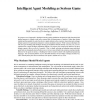125 search results - page 19 / 25 » Causal Discovery as a Game |
COCOON
2003
Springer
14 years 19 days ago
2003
Springer
We design efficient competitive algorithms for discovering hidden information using few queries. Specifically, consider a game in a given set of intervals (and their implied inte...
NOSSDAV
2005
Springer
14 years 27 days ago
2005
Springer
In this paper we propose a fully distributed peer-to-peer (P2P) infrastructure supporting Networked Virtual Environment (NVE) applications, such as massively multiplayer online ga...
AGS
2009
Springer
14 years 2 months ago
2009
Springer
We propose a novel approach to intelligent tutoring gaming simulations designed for both educational and inquiry purposes in complex multi-actor systems such as infrastructures or...
KDD
1994
ACM
13 years 11 months ago
1994
ACM
We applied TETRAD II, a causal discovery program developed in Carnegie Mellon University's Department of Philosophy, to a database containing information on 204 U.S. colleges...
ICCV
2003
IEEE
14 years 9 months ago
2003
IEEE
Dynamic Probabilistic Networks (DPNs) are exploited for modelling the temporal relationships among a set of different object temporal events in the scene for a coherent and robust...



